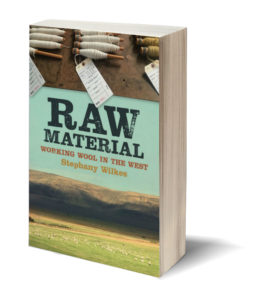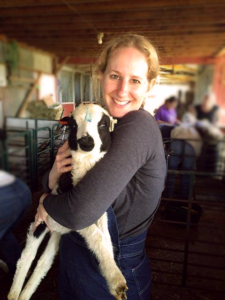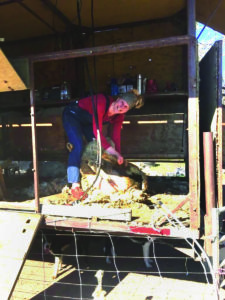
Glen Park resident Stephany Wilkes, vice president of the Glen Park Association, has managed to pull off a coup: taking a niche, arcane subject and writing a page-turner of a book about it.
Wilkes, now 41, is one of those people who end up doing things that weren’t on their original life trajectory. She didn’t grow up on a farm—she was born and raised in Detroit—and didn’t even have any pets: “Absolutely none!”
There was, though, one connection to wool: Her hobby was knitting, taught to her by her grandmother.
Her initial life path was charted early. When she was 4, her grandfather, who’d been a programmer for the Department of Defense, started to teach her programming. By the time she was 18, she worked full-time in tech. She had three jobs in college while taking a full credit load, then earned her Ph.D. in information technology.
In the run-up to the housing crash, Wilkes worked for hedge funds in Chicago, and was dismayed by observing so much financial fraud. In 2007 she and her husband Ian moved to San Francisco.
“The tech sector was horrible in Silicon Valley, the sexism was horrible,” Wilkes said. Pay disparities between men and women for equal work were the norm. “I was super-miserable. I had to get out of that world.”
It took until 2015 for Wilkes finally to leave. But in 2012, she went to a wool symposium, where she heard about a shortage of sheep shearers. So she enrolled in the UC Hopland Research and Extension Center, where she learned the skill.
By the following year, Wilkes was shearing sheep as a side gig. There was high demand; the shearers are a close community, and she got referrals easily.
This year was her sixth season, which ran from January through July; she traveled all over the West shearing sheep. She generally does about 2,000 animals a season; others do up to 30,000.
Wilkes says she loves being outdoors, engaging in physical activity and getting away from people. Sometimes it’s lonely working in a barn by herself. Other times she’s on a big job, with a crew of five or six together for a week, traveling and some bringing their kids along.
 It’s backbreaking work, and dirty. The sheep weigh much more than she does, and handling them is strenuous. “Only your fellow shearer can know how really hard it is, driving long distances to strange places in the middle of nowhere.”
It’s backbreaking work, and dirty. The sheep weigh much more than she does, and handling them is strenuous. “Only your fellow shearer can know how really hard it is, driving long distances to strange places in the middle of nowhere.”
A really good day of shearing goes something like this: “Everything is set up well, I sleep in a bit, the weather is decent, the wool is just peeling off, and I didn’t get too beaten up. A smooth, fun day.”
She tries to have a working vacation every year, going to a job in some remote place and seeing something new. Her current favorite spot is Creede, Colo., located in a valley on the Continental Divide.
Closer to home, the counties of the Bay Area are her territory. She even has a couple of gigs in San Francisco, at the Waldorf and Montessori schools, where the students enjoy taking care of a few sheep on school grounds.
When she gets in a bind, like the car breaking down, Wilkes can rely on her CB radio and her fellow shearers. She was once stuck for two days in eight feet of snow in the Sierra when her chains broke. She keeps a sleeping bag and enough food and water for a week in her car, and does back-country camping in remote areas.
Most of all, Wilkes says, “Camaraderie transcends everything. I can call on any shearer, anytime, and they’ll come and get me.”
In her book, Wilkes candidly admits her fears, shortcomings, and naivete about her new life. She also writes about the nitty gritty of surviving without job security and benefits.
Yet to her, the opportunity to work in an environmentally sustainable way is paramount.
“Sheep get a bad rap,” she says. They’re different from other livestock that are transported hundreds of miles to feedlots. Flocks of sheep grazing the land emit a tiny fraction of the methane that animals on factory farms produce.
“When I was out working, I was meeting people who were doing the most important work there is, intentionally or not.” As she explains it, they’re taking CO2 out of the atmosphere, using carbon farming methods established by the National Resources Conservation Services. Sheep are a part of the cycle that removes CO2 from of the air, decreasing greenhouse gases.
Plants suck CO2 from the atmosphere, and it goes into the soil. Treating the soil with compost helps the process along, and actually increases the soil’s ability to capture carbon for a hundred years. This can help defer global warming. The rich pasture requires little or no tillage. It acts as a windbreak and stops soil from blowing away.
Grazing is important ecologically. As animals move from place to place, their manure feeds nutrients into the soil and their hooves stomp the nutrients further in. That means fertilizers aren’t needed. In arid climates, the soil gets compacted and animal hooves break up the crust, allowing native grasses to put roots into soil.
Grazing keeps all these systems in check. Sheep help it along more than heavier animals because they don’t compact the soil as much. Grazing sheep eat the stored carbon, sequestering it, so that the wool and the garment made from it is “carbon sink,” or carbon negative. Less CO2 is released, which is positive for the climate.
With the number and severity of recent wildfires, Wilkes contends, we should have grazing everywhere to reduce the fuel for the massive conflagrations.
At the consumer level, sheep are a bonanza. People appreciate their meat and cheese. Wilkes wishes people cared as much about where their clothing comes from.
Today most clothes are made from fabrics that are oil-based, extractive and synthetic, made in the lab, using chemicals and toxic dyes. Wool and other natural fibers produced with sustainable methods, in contrast, help keep the environment in balance.
 Wilkes laments an historic lack of infrastructure for processing California wool and the economics that conspire against a healthy wool-processing industry. That means our wool is mostly shipped out of state or overseas for processing into clothing before returning here or heading elsewhere.
Wilkes laments an historic lack of infrastructure for processing California wool and the economics that conspire against a healthy wool-processing industry. That means our wool is mostly shipped out of state or overseas for processing into clothing before returning here or heading elsewhere.
When she’s not sheering sheep, Wilkes still works on sheep and wool—lectures, fiber workshops, freelance writing, ghostwriting for business executives—and hoof trimming.
She’s also president of an agricultural co-op, the Fibershed Marketplace (www.fibershed.com), an Etsy-like, certified organic platform for farmers. Right now, there are a few dozen members. They’ll be selling wares that have been produced with documented carbon farming practices, natural dyeing, and with local labor and textiles. She hopes that people will be willing to pay more for things that are good for the climate.
In the off season, Wilkes does Pilates and a lot of exercising at the gym. Though she’d like to drink beer and knit, she needs to build up her strength to be ready for the next season. Those sheep don’t shear themselves.